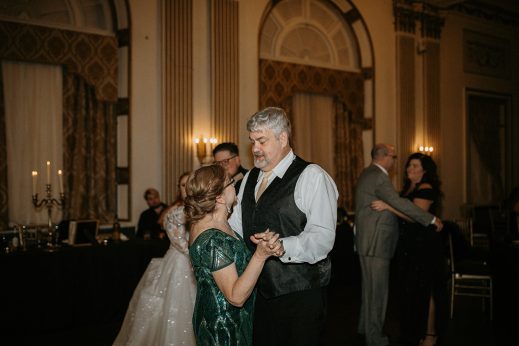In just one year, Matthew Yaras survived a blood infection, cardiac arrest, and the amputation of his lower right leg.
Still, he never lost hope that he’d dance at his son’s fast-approaching wedding.
Matthew’s dream came true in October 2023. Just weeks prior, he completed inpatient rehabilitation at the UPMC Rehabilitation Institute at UPMC Passavant for prosthetic training following his leg amputation.
He and his family credit UPMC’s physical and occupational therapists with laying the foundation for Matthew’s in-home and outpatient therapies. They also credit them with giving him the once-in-a-lifetime opportunity to walk down the aisle and dance at his son’s wedding.

Never Miss a Beat!
Subscribe to Our HealthBeat Newsletter!
Thank you for subscribing!
You can now select the specific newsletters you'd like to receive.
You are already subscribed.
Subscribe to more newsletters in our email preference center.
Sorry, an error occurred. Please try again later.
Get Healthy Tips Sent to Your Phone!
Walking on the First Day
“For years, I’ve had problems with my legs and my feet,” says 60-year-old Matthew. “I’ve had plenty of surgeries on my feet.”
Matthew’s first surgery to amputate his lower right leg was to take place in January 2023. But a series of life-threatening setbacks delayed that procedure by more than six months.
“In December 2022, we found a blood clot and infection in my right leg, so I ended up in the intensive care unit for seven weeks,” he says.
“During that time, I went into cardiac arrest, and the ICU staff brought me back to life. But because I was in the hospital for so long, I lost a lot of muscle tone in my body. We knew I’d have to have my leg amputated for sure.”
After his July 2023 surgery, he started recovery with an eye on his son’s October wedding just a few months away. Matthew became determined to heal from his procedure, settle into his new prosthetic device, and begin rehabilitation in time.
“The surgery went great, and they did a fantastic job,” he says.
“The amputation never bled, it never really hurt. Then I went to see Max. I told him my son was going to get married soon and my goal was to walk and dance at the wedding.”
Max Hurwitz, DO, specializes in physical medicine and rehabilitation at the UPMC Rehabilitation Institute. He evaluated Matthew and initiated his rehabilitation journey.
“Dr. Hurwitz got me into inpatient physical therapy for a week at the beginning of October, and the people there were incredible,” says Matthew. “Very personable, and they got me up and able to walk pretty much on the first day with a walker or a cane. By the end of the week, I was walking without any of those helpers.
“The physical therapists were really great,” he continues. “I was able to walk up steps quickly, and even the staff was surprised how fast I picked everything up.”
Thanks to Matthew’s motivation and the dedicated staff at UPMC Passavant, he and his family created unforgettable memories at his son’s wedding.
He walked down the aisle, danced, and enjoyed his time with family and friends.
“I had a great experience overall,” he says.
Expert Care at the UPMC Rehabilitation Institute
The UPMC Rehabilitation Institute is a leader in inpatient rehab. Each of UPMC’s inpatient rehab locations is in an acute care hospital. This means you’ll never go without access to emergency or diagnostic care.
Inpatient physical rehab can help you restore function and get back on your feet faster.
Located just north of downtown Pittsburgh, inpatient rehab services at UPMC Passavant include:
- Expert care from the UPMC physical medicine and rehab team.
- An in-unit gym for easy access to daily treatment.
- A life skills apartment.
- Physical, occupational, and speech-language therapy.
- Rehab for heart and lung diseases.
- Social support, case management, and support groups.
- Specialized equipment, such as body-weight-supported treadmills.
Visit the UPMC Rehabilitation Institute website for a full list of locations and contact information.
About UPMC Rehabilitation Institute
The UPMC Rehabilitation Institute offers inpatient, outpatient, and transitional rehabilitation, as well as outpatient physician services so that care is available to meet the needs of our patients at each phase of the recovery process. Renowned physiatrists from the University of Pittsburgh Department of Physical Medicine and Rehabilitation, as well as highly trained physical, occupational, and speech therapists, provide individualized care in 12 inpatient units within acute care hospitals and over 80 outpatient locations close to home and work.
